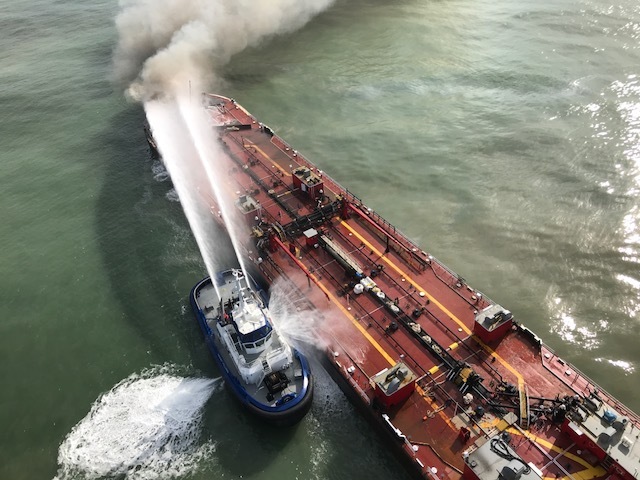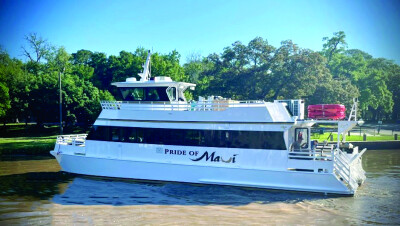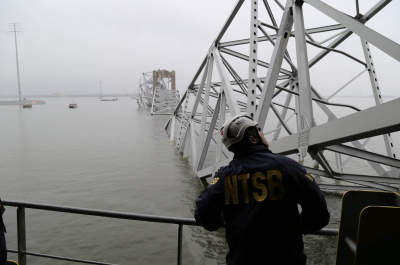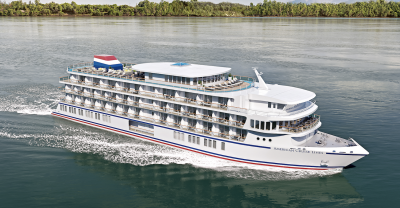Investigators piecing together causes of the fatal 2017 barge explosion that killed two crewmen near Port Aransas, Texas, traced a string of serious problems in the Bouchard Transportation Co. fleet, despite passing ABS surveys and Coast Guard inspections, according to the National Transportation Safety Board
The B. No. 255, a 488’ oceangoing tank barge and its 127’x37’x20’, 6,140-hp tug Buster Bouchard, were getting underway from an anchorage off Port Aransas, Texas, with a cargo of crude oil when it blew up and burned around 4:30 a.m. on Oct. 20, 2017. Zachariah Jackson, 28, of Salt Lake City, and crewmate Du’Jour Vanterpool, 26, of Houston were killed.
After Coast Guard investigators found corrosion and poor material conditions on the stricken barge, the Coast Guard took a close look at Bouchard’s entire tank barge fleet.
“As a result of these expanded inspections, which were conducted from October 2017 to December 2018, the Coast Guard issued 251 deficiencies to 25 barges and placed operational controls on 10 barges, limiting or preventing their operation until the discrepancies were corrected,” according to the NTSB report issued May 9.
“One barge was issued 66 deficiencies, and another was issued 33 deficiencies despite both being inspected by the Coast Guard and classified by ABS. In addition, 5 of the 10 barges that were issued operational controls were transporting oil in bulk and had extensive corrosion discovered within cargo tanks and along the hull,” the report says
The B. No. 255 itself had been checked by ABS surveyors and Coast Guard inspectors in months prior to the accident and approved for operation. But investigators found Coast Guard inspectors missed electrical discrepancies and other faults that had been identified earlier by ABS, but not yet corrected by the time Coast Guard inspectors came aboard.
Conditions on other Bouchard barges were examined during July 2018 Coast Guard hearings into the accident. Morgan Jackson, brother of explosion victim Zach Jackson and a former mate on the Bouchard barge B. No. 275, told how in May 2017 he was nearly overcome by fumes and incapacitated for two hours after trying to work in the aft peak of that barge with a vapor leak.
The NTSB report recommends the Coast Guard and ABS establish new policies and procedures for joint communication and sharing of information for inspecting vessels.
That could add pressure to reforming vessel inspections and how third-party surveyors and classification societies like ABS figure into safety management. The same kind of critique emerged from the investigation into the sinking of the Tote Maritime cargo ship El Faro in 2015, when investigators reported that surveys and inspections failed to find material condition problems that contributed to the sinking in Hurricane Joaquin with the loss of 33 lives.
Among its conclusions, the NTSB faulted Bouchard’s safety management system (SMS) and maintenance processes, and recommended the company work with an independent third party to evaluate the SMS “to identify the areas that allowed for the poor mechanical and structural condition of the B. No. 255 and revise the SMS to address identified deficiencies.”
Likewise, the NTSB called on the Coast Guard to take a close look at how its inspections are done, and to better coordinate that work with ABS surveyors looking at the same vessels. In the case of B. No. 255, an annual Coast Guard inspection in May 2016 found no problems, “despite the fact that an ABS survey 3 three months prior had found numerous discrepancies with the vessel’s electrical system—discrepancies that were not documented as corrected until June 2016, a month and a half after the Coast Guard’s inspection.
The next annual inspection during May 2017 again found no discrepancies. But nine days before an inspection by Oil Companies International Marine Forum (OCIMF) found that 50% of the hull coating had failed, with corrosion where there was no coating. Bouchard Transportation’s own internal audit during that same timeframe spotted several areas of concern in need of immediate repair.
NTSB investigators say they learned that the Coast Guard an ABS had no detailed communication about deficiencies in the months prior to the explosion.
“Had the Coast Guard marine inspector who conducted the annual inspection in May 2017 been in contact with the ABS surveyor who attended B. No. 255 in March of that year and been aware of the previous survey findings, the inspector may have expanded the annual inspection,” the report says. “An expanded inspection could have identified discrepancies and improved the overall condition of the barge."
Among its recommendations, the NTSB report calls for the Coast Guard and Abs to establish “joint policy and procedures to share information, including all results and findings from audits, surveys, examinations, inspections, and other applicable activities related to vessel safety.”





